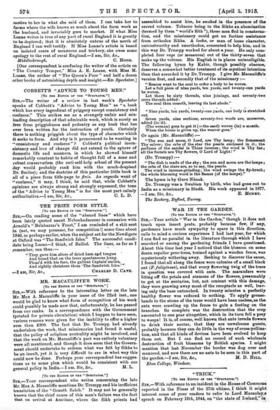WAR IN THE GARDEN.
(To THE EDITOR OF THE " SPECTATOR:1 SIE,—Your article "War in the Garden," though it does not touch upon insect pests, probably because few, if any, gardeners have much sympathy to spare in this direction, calls to mind a curious experience I had last year, for which I can find no parallel in the literature through which I have searched or among the gardening friends _I have questioned. About this time Just year I noticed that the blossom on some dozen espalier pear-trees; trained against a wooden fence, was mysteriously withering away. Seeking to discover the cause, I found that all along the fence were colonies of a small black ant (F. fuliginosa), and that every flowering twig of the trees in question was covered with ants. The marauders were biting off the petals and stamens of the flowers, presumably to get at the nectaries, but, not content with this damage, they were gnawing away most of the receptacle as well, leav- ing only the base untouched. In twenty minutes a perfectly healthy flower was reduced to nothing. To apply grease- bands to the stems of the trees would have been useless, as the ants were crawling up the fence to gain a footing on the branches. So complete was the destruction that the crop amounted to one pear altogether, which in its turn fell a prey to wasps! It is, of course, well known that ants invade flowers to drink their nectar, that they are unwelcome guests, probably because they can do little in the way of cross-pollina- tion, and that all kinds of devices have been evolved to keep them out. But I can find no record of such wholesale destruction of fruit blossoms by British species. I might mention that last November the border was dug over and manured, and now there are no ants to be seen in this part of














































 Previous page
Previous page